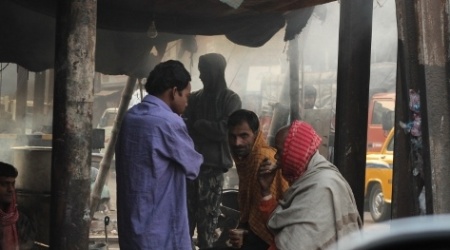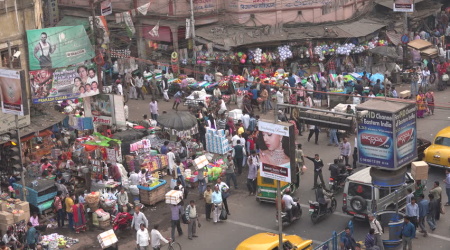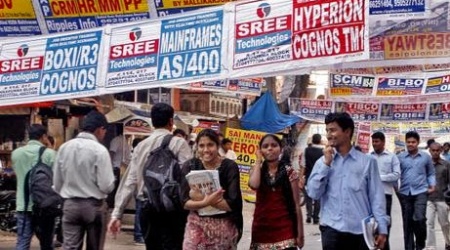In this reflexive piece Uttam—a theatre activist situated in West Bengal—reflects on his hometown, the ugly changes it is passing through, and its devastating impact on education: the way young students are becoming victims of middle class aspirations and market-induced demands.
Uttam a theater activist and writer situated in West Bengal.
My hometown is changing. It was a small district town in West Bengal. The flowing river, the shade of an old banyan tree, the gentle breeze, face to face interactions, local clubs, small and vibrant tea shops, a couple of schools and a college, and the narratives of ordinary people—my hometown was rhythmic. We learned to respect the dignity of simple living (it didn’t matter whether one was a school teacher, a clerk in the PWD office, a whole timer in the Communist Party), not the markers of ‘success’. Even amidst this simplicity, or what economists regard as ‘low growth’, there was enough time for us to reflect on Tagore’s literature, Ray’s films, American imperialism and Vietnam War. We didn’t know that one ought to be perpetually striving for the latest product in the market, and contentment with simple things of life should be seen as ‘backwardness’.

However, everything that is phenomenal changes. My town too is changing. I witness and experience this change, and try to make sense of it. The larger politico-economic forces—the onslaught of the market and the media, the aspirations for ‘success’ and ‘good living’ that characterize the new middle class, and the chronic restlessness that accompanies human existence in this fast world with the redefinition of time as a measured commodity—are altering the cultural landscape of my hometown. I see the rapid flow of people from surrounding villages in search of ever growing ‘English medium’ schools; I move around the crowded town with unplanned/congested housing societies and dark/cage like flats; I rethink my urge to walk because of the constant movement of cars, bikes and other vehicles in tiny roads; I observe the entry of fast food joints and shopping malls, and above all, the blooming industry of nursing homes and diagnostic clinics (is there a positive correlation between ‘development’ and illness?).
It becomes exceedingly difficult for me to recognize the town I cherished as a young wanderer. Yes, India is changing. I know I cannot stop the flow of change. Yet, my ‘reason’ fails; my heart becomes heavy; and I experience deep pain. And as I look at myself, I feel that it is primarily the state of young children that has shocked me most. In this small piece, I wish to share with my readers the story of this pain.

Let me begin with the everyday routine of a student of Class XII. I know this boy; I am closely related to his family. Yes, he studies at the Ramakrishna Mission School—possibly ranked as the best school in the town. However, it does not matter. There is no escape from private tutors and coaching classes. For every subject, be it Physics, Chemistry, Mathematics, Biology and English, there are two private tutors. Furthermore, there are special tutors (every weekend they come from Kolkata, move around the town, and sell their ‘skills’) who train him for entrance tests for medical/engineering colleges. Therefore, you can imagine his day. From private tuition to school, from school to coaching class—he is running, running all the time. His parents keep expecting more and more from him. Yes, he is virtually a ‘resource’ to be continually trained so that he can emerge as a ‘successful’ product. I try to talk to him. I cannot. He does not have the time. And even his parents do not want him to waste his time by engaging with me. I wanted to talk about life and literature, cinema and music, politics and culture, technology and sports. I wanted to give him a good book of literature to read. I could not. I too felt that he would read nothing except what ‘matters’—notes given by private tutors, guide books and textbooks.

But then, he is not alone. It is the same story everywhere. Visit my hometown. You would notice that young boys and girls are continually moving from one tutor to another. And the only relaxation, it seems, is fast food or the magical screen of the smart phone. The pathetic state of education, I assume, is inseparable from the structural changes that my hometown is passing through. What we call ‘development’ has made all of us insecure, restless, competitive, self-possessive and recklessly ambitious. Everybody has to be a ‘topper’; everybody has to be an ‘engineer’; everybody has to join a multinational corporation; everybody has to earn a great deal of money. In such a world, there is no peace, no contemplation, and no breathing space to know the rhythm of one’s own being. Everybody is running, following the crowd.
Yes, studentship seems to have disappeared. There is no wonder left. The critical faculty has disappeared. It is absolute dependence on tutors, guidebooks, success mantras. And what is really tragic is that in such a society teachers disappear. A teacher as a catalyst, as an inspiring figure—who is in tune with the vocation of what philosophers regard as dialogic learning—is killed every moment. What we see around is a coaching centre tutor, an instrumental ‘private tutor’, a ‘subject expert’ for a narrow fragment of knowledge. But seldom do you find a teacher who inspires, who tells a different story—the story of a river and a tree, who takes the child beyond Geography and Mathematics, who believes that money is not the measure of everything. No wonder, I do not find good book shops in the town; the District Library remains empty; the culture of reading is in decline.
I ask myself: What would be the ultimate achievement of this rat race? Possibly the young boy I referred to would join an engineering college, become a software engineer, work in a company, give his soul to the corporate boss, earn some money, and buy an apartment in Gurgaon. Is it what the meaning of life all about? Or is it that it is a forbidden question we should not allow our children to ask? In case, he cannot make it, what would happen to him? Can he and his parents bear this ‘failure’, this stigma? Who would tell him that God has sent him in this world not as a mere employee with a fixed monthly salary, but as a wanderer, and there is a world beyond what the success-obsessed middle class can imagine? Are his parents capable of this? Or are there good teachers (not private tutors of coaching centres) left who can touch his head, whisper in his ears, enter his soul, and show him the possibility he is gifted with? We seem to have destroyed all these possibilities. The market has no soul; coaching centres have no philosophy; private tutors have no poetry; instrumental learning has written the obituaries of good teachers, and ironically, parents have no courage to think differently.
Yes, my hometown has changed. India has changed. DEVELOPMENT is the new mantra! Hang me, I have not changed.
The New Leam has no external source of funding. For retaining its uniqueness, its high quality, its distinctive philosophy we wish to reduce the degree of dependence on corporate funding. We believe that if individuals like you come forward and SUPPORT THIS ENDEAVOR can make the magazine self-reliant in a very innovative way.














